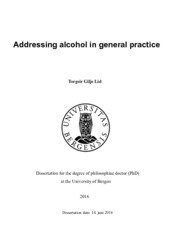Addressing alcohol in general practice
Doctoral thesis
Permanent lenke
https://hdl.handle.net/1956/12158Utgivelsesdato
2016-06-14Metadata
Vis full innførselSamlinger
Sammendrag
Alcohol use is integrated in many cultural settings, and the positive functions of alcohol as experienced by users are numerous. The Norwegian community has undergone major changes in the past two decades, with an increase in consumption of more than one third. Alcohol is potentially relevant for many medical conditions and health problems. While addiction is a serious problem for those afflicted, many more experience negative health effects from their own or from a significant other’s alcohol consumption. Risky or harmful alcohol consumption is frequently not recognized in health care, and efforts to improve recognition of and treatment for alcohol-related health problems have not been very successful. The aim of my PhD is to contribute to increased awareness and understanding among general practitioners regarding the relevance of alcohol in clinical situations, and to contribute to development of better strategies to address alcohol. The first study was a focus group study where we explored general practitioners’ experiences from addressing alcohol. We focused on why they asked about alcohol, how they did it and what happened. We analysed interview data from 13 general practitioners. Sometimes asking was triggered by specific symptoms or health problems, by negative changes in the patient’s condition or by a family member expressing concern. In other situations they asked because of routine, as with certain health certificates, a general check-up, meeting a new patient or because of pregnancy. They adapted their asking to their personal style, the patient and the situation. The main finding of this study was that they in many situations addressed alcohol based on clinical relevance, and in certain routine consultations they addressed alcohol as part of that routine. We have coined this pragmatic case finding. In the second study we explored facilitating and hampering factors for the implementation of pragmatic case finding. This focus group study was performed in the context of a four-session seminar in group practices. Fourteen doctors participated in the focus group interviews, and an additional interview with five general practitioners from other surgeries was later performed. We explored both individual and system factors. An important individual factor was time, perceived as both a challenge and an opportunity. Even though pressed for time, they could also plan for lengthier or more frequent consultations when necessary. The dual nature of alcohol as both normal and a potentially shameful individual problem was a challenge, but focusing on the normal aspects made it easier to talk about alcohol. Addressing alcohol was also easier when they focused on relevance for the patient’s health problem. The main system factor regarding implementation of pragmatic case finding was a tension between the mutual commitments in the surgery and the individual doctor’s need for autonomy. Younger doctors emphasized the mutual commitments and reported more collective strategies for learning. The aim of the third study was to explore whether historical data in electronic patient records might aid in earlier recognition of alcohol-related health problems. Nine surgeries with 36 doctors were recruited, and data from 20764 patients on classified non-narcotic medications, new sick leaves, elevated blood tests of gamma-glutamyl transferase or mean corpuscular volume, and potentially alcohol-related diagnoses in ICPC-2 and ICD-10 were collected and analyzed. The observation period was four to 21 years. Adjusted Cox-regressions revealed a significantly increased risk for alcohol use disorder for all variables, with strongest effect for elevated blood tests and weakest for classified non-narcotic medications. The results were not strong enough to enable the development of a clinically useful tool, but they emphasize the relevance of alcohol for many frequent health problems in general practice. My thesis indicates that an identification strategy based on clinical relevance and targeted screening is feasible in general practice. Pragmatic case finding is a framework enabling improvement by expanding knowledge on the multitude of clinical situations where alcohol may be relevant. Many frequent events in general practice may indicate vulnerability for developing an alcohol related health problem, and thus should prompt the GP to explore whether alcohol might be relevant for the patient’s health. Group practices with collective strategies for learning and quality improvement are well suited for improving knowledge and skills in identifying when and how alcohol may be relevant for a patient.
Består av
Paper I: Lid TG, Malterud K. General practitioners’ strategies to identify alcohol problems: A focus group study. Scand J Prim Health Care, 2012;30(2):64-9. The article is available in BORA at: http://hdl.handle.net/1956/12157Paper II:Lid TG, Nesvaag S, Meland E: When general practitioners talk about alcohol: exploring facilitating and hampering factors for pragmatic case finding. Scand J Publ Health, 2015;43:153-8 This article is not available in BORA. The published version is available at: 10.1177/1403494814565129
Paper III: Lid TG, Eide GE, Dalen I, Meland E. Can routine information from electronic patient records predict a future diagnosis of alcohol use disorder? (Resubmitted Scand J Prim Health Care) Manuscript. This article is not available in BORA.
